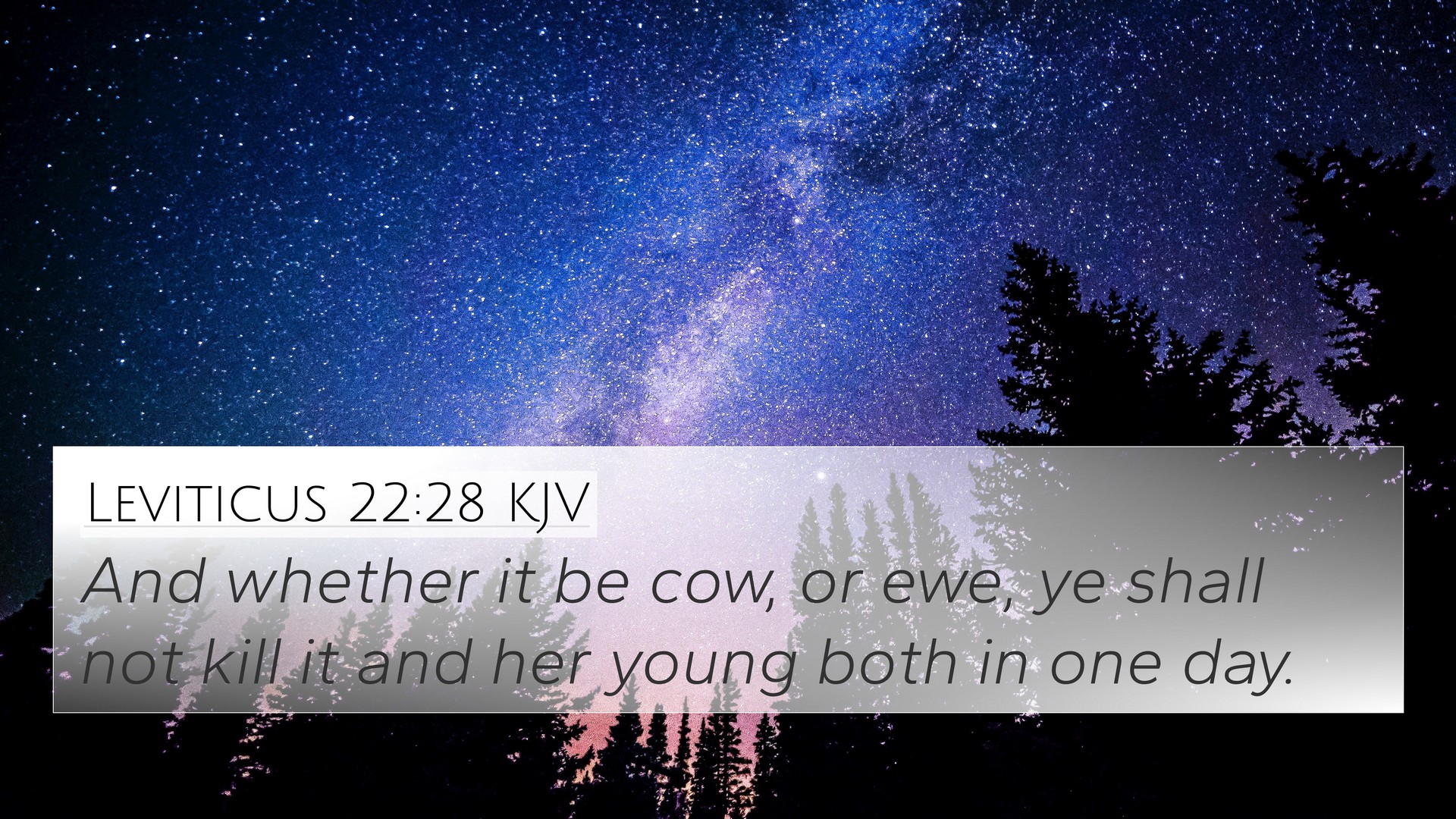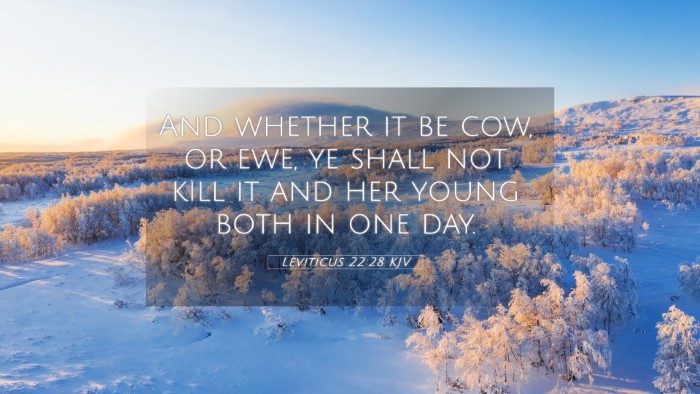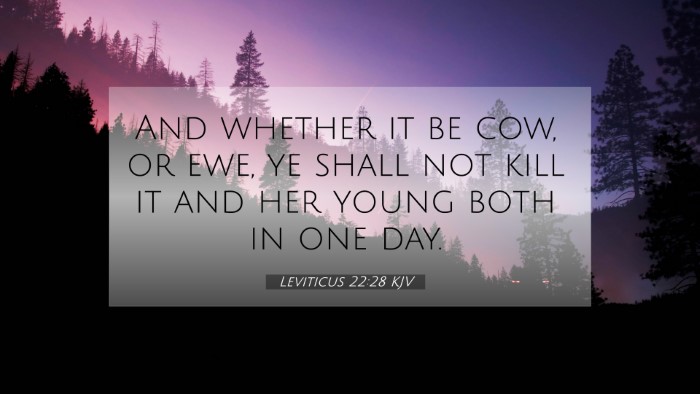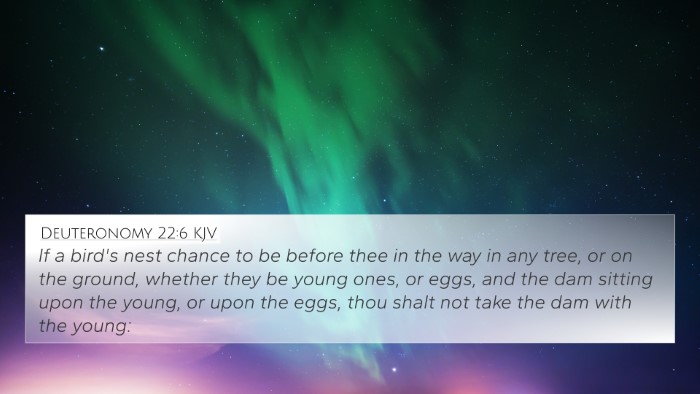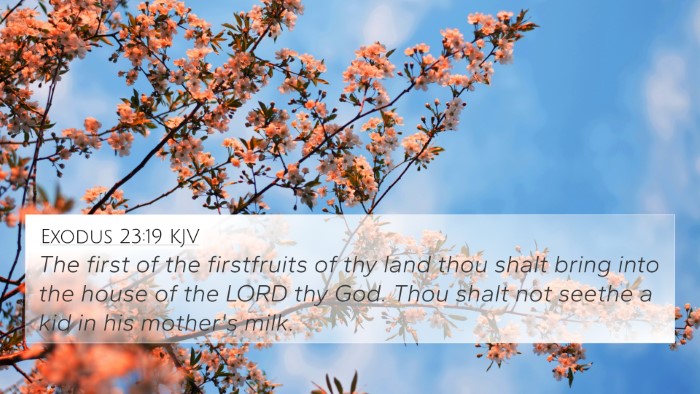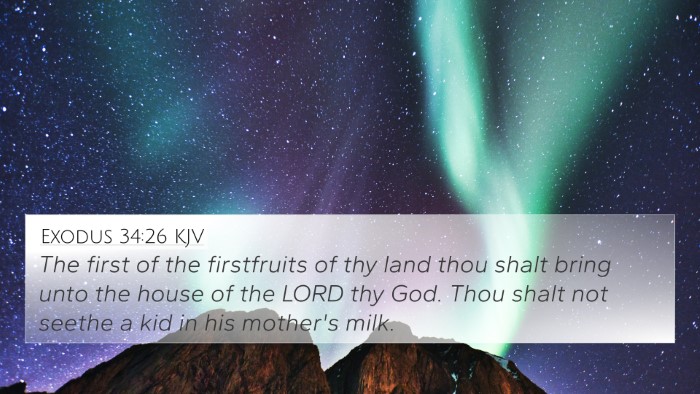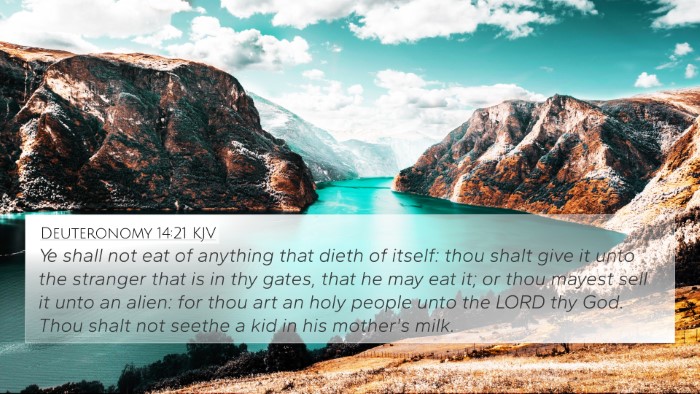Meaning and Interpretation of Leviticus 22:28
Leviticus 22:28 states: "And whether it be cow or ewe, ye shall not kill it and her young both in one day." This verse conveys important principles regarding the treatment of livestock and offers broader insights applicable to the ethical reservations regarding life and redemption in biblical law.
Overview
This instruction from the Lord through Moses provides guidance concerning sacrificial practices and their implications on mercy and kindness. It emphasizes an ethical approach towards animals, reflecting God's concern for creation. The prohibition serves to ensure that the killing of livestock is not done recklessly or in a manner that demonstrates a lack of respect for life.
Commentary Insights
- Matthew Henry: Henry explains that this verse illustrates the sanctity of life. By forbidding the killing of a mother and her offspring on the same day, it showcases the mercy that should be shown towards living creatures, indicating the Lord's compassion is extended to all aspects of creation.
- Albert Barnes: Barnes emphasizes the practical aspect of this law, noting that in ancient agricultural societies, the loss of both a mother and its young could lead to severe hardship. The verse serves as a protection against unnecessary waste and promotes thoughtful stewardship over God's resources.
- Adam Clarke: Clarke takes a spiritual interpretation, suggesting that the command might symbolize the relationship between God and His creation; it reflects the broader theological theme of mercy and the sanctity of life that resonates throughout the Scriptures.
Thematic Connections
Leviticus 22:28 is intertwined with various themes found throughout the Bible, particularly in its emphasis on compassion and stewardship. Here are several thematic connections:
- Respect for Life: This verse parallels Deuteronomy 22:6-7, which speaks about a mother bird and her nest, reinforcing the idea of respecting the life cycles of animals.
- Compassion in Sacrifice: In Matthew 12:7, Jesus states, "But if you had known what this means, 'I desire mercy and not sacrifice,' you would not have condemned the guiltless." This reinforces the idea that mercy should prevail over ritual.
- Ethical Treatment of Animals: Proverbs 12:10 states, "A righteous man cares for the needs of his animal...", echoing the same sentiment of responsible stewardship of God's creatures.
- The Nature of Sacrifices: Hebrews 10:4 expresses that "It is impossible for the blood of bulls and goats to take away sins." Linking back to the nature of sacrifices, this shows how the intention behind sacrificial laws matters more than the act itself.
- God’s Provision: Genesis 9:4 also speaks about the prohibition against consuming blood, indicating a deeper understanding of life and its sanctity.
- The Holiness of God: Leviticus 11 further expands on clean and unclean animals, echoing the theme of God’s holiness and the community’s responsibility towards it.
- Community Responsibility: Galatians 6:10 reinforces the need to "do good to all people...", suggesting that our treatment of animals extends to how we regard fellow humans in our community.
Cross-References to Leviticus 22:28
Here are specific cross-references that align with the principles found in Leviticus 22:28:
- Genesis 1:26-28 - God grants humans dominion over creatures, stressing a responsible stewardship.
- Exodus 23:19 - Also expresses care by prohibiting boiling a goat in its mother’s milk, echoing the theme of compassion.
- Deuteronomy 14:21 - Similar prohibitions underline ethical considerations regarding sacrifices.
- Proverbs 27:23 - Teaching the importance of taking heed to the state of one's flocks and herds emphasizes loving stewardship.
- Isaiah 11:6-9 - A vision of peace among creatures showing God's ultimate intention for creation.
- Matthew 10:29 - Jesus mentions that not a single sparrow falls without God's knowledge, highlighting divine care for all life.
- Revelation 5:13 - Shows the worship of creatures and helps depict the reverence God has for all creation.
Conclusion
Leviticus 22:28 reflects essential principles about mercy, ethical treatment, and the sanctity of life, resonating throughout the scriptures. These themes encourage readers to cultivate a compassionate perspective that informs not just their treatment of animals but also their interactions within their communities and their relationship with God. Moreover, the connections highlighted through cross-referencing facilitate a deeper understanding of God's character and His divine plan for creation.
Exploring Bible verse cross-references and thematic Bible verse connections can greatly enhance one's study of the Scriptures, providing analytical tools and resources to identify relationships between various texts, ultimately enriching the understanding of biblical teachings.
